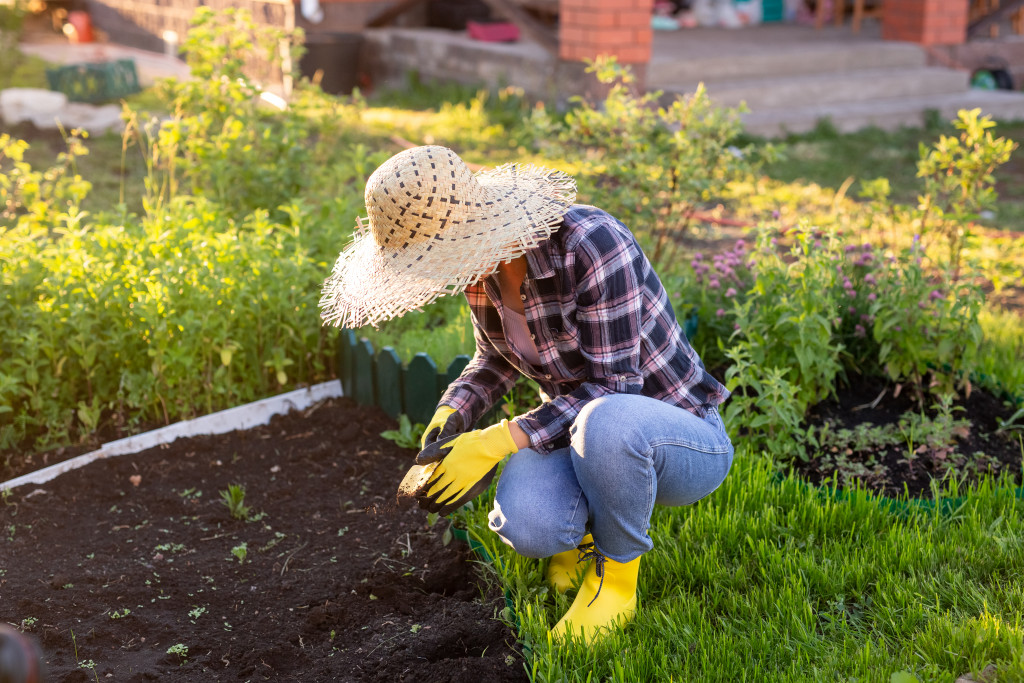Spring has sprung, which means it’s time to get your gardens in tip-top shape! But even the most green-fingered among people can run into problems from time to time. Here are some of the most common garden maintenance problems—and how to solve them.
1. Yellow Leaves on Your Plants
If your plants are showing yellow leaves, chances are they’re lacking some key nutrients. Give them a fertilizer with a good balance of nitrogen, phosphorous, and potassium to revive their color. You can also add some compost to the soil around your plant’s roots to boost essential minerals.
To make compost, start with a balanced mix of carbon-rich materials such as dried leaves, wood chips, sawdust, and straw. Then add nitrogen-rich materials like grass clippings and food scraps (but avoid meat and dairy products). Moisten the mixture slightly and let it sit for several weeks to create an earthy compost full of essential nutrients.
Additionally, be sure you’re watering your plants regularly, but not too much. Too much water can drown the roots, while too little won’t give them enough to drink.
2. Black Spots on Your Leaves
If you’re seeing black spots or powdery mildew on your leaves, it’s likely caused by the environment. Too much sun can cause leaf spotting, while too little sunlight will lead to pale patches that are prone to fungi.
To get rid of mildew, mix one tablespoon of baking soda with two and a half tablespoons of horticultural oil or liquid soap in one gallon of water. Spray this solution on your leaves once a week for several weeks until the mildew is gone.
You should also remove affected leaves and dispose of them. This way, you can prevent the spread of mildew to other plants. Lastly, avoid getting water on the leaves when you’re watering your plants, as this can promote fungal growth.
3. Not Enough Sunlight
If your plants aren’t getting enough sunlight, it can lead to wilting and low yields. To solve this problem, move your plants closer to windows or outside where they can get more direct sunlight. If you don’t have the option of moving them outdoors, try investing in some grow lights to give your plants the extra boost of light they need.
You can also make sure your plants are positioned to maximize their access to the sun’s rays. For instance, place taller plants in the back and smaller ones in the front. This way, they all get their fair share of sunlight.
If all of this is not possible, try growing sun-loving plants instead. They’ll be better suited for your environment and require less maintenance.

4. Clogged Pipes
If your garden’s pipes are clogged, pigging pipeline cleaning is a great way to clear them out. This process involves sending specially designed pigging devices down the pipes to scrape out debris and other blockages, allowing water to flow freely again.
The pigging process is usually done with specialized equipment, so it’s best to leave the job to a professional plumber. They’ll be able to determine the right type of pigging device and can make sure it’s done correctly.
Moving forward, make sure to keep an eye on your pipes. Regularly inspecting them and cleaning out any debris or blockages can help prevent clogs in the future.
5. Pests
Pests can wreak havoc on your garden. To keep them at bay, try using some natural pest control methods such as companion planting or making homemade insecticidal soap.
Companion planting involves growing certain plants that are known to repel pests near other plants in your garden. For example, planting garlic near tomatoes will help ward off pests that attack tomatoes.
You can also make your own insecticidal soap by mixing four teaspoons of dish soap with one gallon of water and spraying it on the affected areas you observed. This helps deter pests without using harsh chemicals or pesticides.
Finally, be sure to keep your garden clean and free of debris. Pests love lurking in clutter, so getting rid of any piles of leaves or trash can help keep them away.
6. Weeds
Weeds can take over your garden quickly, so it’s important to stay on top of them. The easiest way to remove them is to pull them out by hand, but this can be time-consuming and tedious.
If you have a lot of weeds in your garden, you might want to try using a herbicide. These products contain chemicals that kill weeds and prevent new ones from growing.
You can also try mulching with newspaper, cardboard, wood chips, or straw to keep weeds at bay. Mulch acts as a barrier between the soil and the sunlight, which helps stop weed seeds from germinating.
Finally, make sure you’re watering your garden correctly. Overwatering can create the ideal environment for weeds to grow, so try to keep your plants on a regular watering schedule.
Gardening is a great way to get some exercise and fresh air while spending time outdoors—but it’s not always easy! By being aware of the most common problems and armed with the right solutions, you can maintain a healthy, happy garden all season long.

